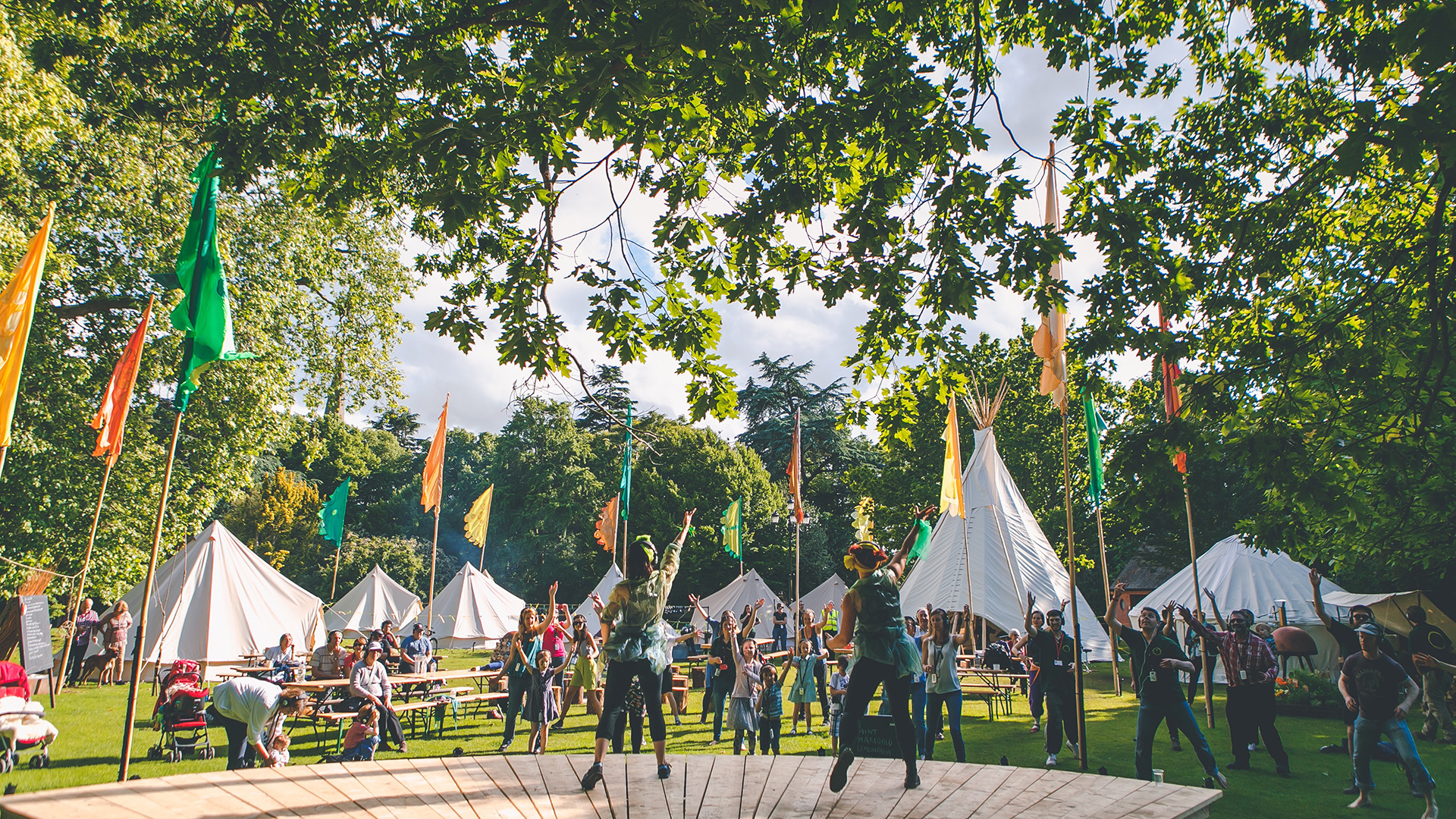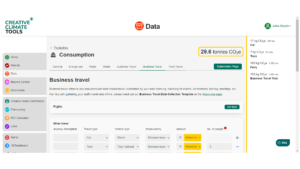- Posted on June 14th, 2024
More Than Numbers

How Culture Can Use Data to Make Positive Change
Data is the lifeblood of today’s world, holding immense power to shape decisions and outcomes. Since Julie’s Bicycle was formed in 2007, we have always believed in the power of data to inspire and drive meaningful action on climate change. We are guided by a deep respect for science, data and expertise, and draw from data and research across all of our work.
With the UK government’s pledge to reduce its greenhouse gas emissions to net zero by 2050, organisations and businesses are setting goals and mapping out actions in order to play their part. Our Digital Lead, Paul Griffiths, talks us through how culture can use data to be accountable to ourselves and to one another, and contribute to the sector’s shared climate action.
Read on for inspiring examples from the cultural community and top tips on environmental reporting for Arts Council funded organisations!
The Power of Data in Environmental Reporting
Environmental reporting isn’t just about numbers; it’s about the stories those numbers tell. Through our work with the Arts Council England and other organisations, we’ve seen firsthand how focusing on data and reporting, both qualitative and quantitative, can illuminate paths towards sustainability and foster collective action and accountability. Our Creative Climate Tools (CC Tools) are designed to make this process simple, enabling artists and cultural organisations to track their environmental impact and make strategic changes. We provide these to the sector free of charge.
“Julie’s Bicycle has a great set of tools and guidance about things like waste and green travel plans, which mean that we don’t have to reinvent the wheel when we want to focus on a particular area for improvement.”
– Kirsten Walker, Horniman Museum.
Since ACE funded organisations began entering their data into our CC Tools (formerly CG Tools) in 2012, we have been able to follow the trajectory of their environmental action across Arts Council England’s Portfolio of funded organisations – comprising 1000s of organisations from multiple art forms right across the country. Since reporting began, average energy emissions per organisation have reduced by 50%. The data has helped us paint a comprehensive picture and share eExciting and inventive new ways of working that have been explored, allowing the sector to lead by example, and embed creative responses to climate change into the fabric of our work.
This sector-wide amalgamated data is a contribution to wider climate action efforts. Understanding large data sets over time makes the case that as a sector we are taking action. It demonstrates that we are valuing one another’s contribution and making a difference. The combination of greenhouse gas (GHG) data and wider stories of commitment to action is – ultimately – an act of appreciation. The evidence generates a compelling argument for creative climate action. Not just to one another, but to policy makers and to the world we share.
Success stories and examples from the sector

Spotlight programme
The Spotlight programme, which ended in 2022, is a really interesting example of what can be achieved when you use your data to influence your strategy. Our findings from analysis of data from the Tools showed us that a small proportion of Arts Council England National Portfolio Organisations (NPOs), typically those with large infrastructures, were responsible for a third of the entire portfolio’s total carbon emissions. In response to these findings, the Spotlight Programme was launched.
JB worked with 30 NPOs over a period of 5 years to achieve measurable reductions through developing good environmental management practices and setting achievable, yet ambitious, Environmental Impact Reduction Objectives. The group reduced its electricity usage by 19% and reduced its gas usage significantly – by 32%.
Building on these Spotlight achievements, we have now begun a new project to support more NPOs as well as the wider sector – Transforming Energy. This programme provides guidance, templates and other resources to cultural organisations for free, and we hope that many more organisations will be able follow in the Spotlight organisations’ footsteps, and use them to decarbonise and reduce emissions.
Watch videos from Sage Gateshead, Tullie House and Young Vic to hear about their achievements through Spotlight.
Slung Low: gathering qualitative data on their ancient woodland
Slung Low is an award-winning theatre company specialising in making epic productions in non-theatre spaces, often with large community performance companies at their heart. Based in Leeds, they are a building-based organisation set in an urban context. Moving venues has brought the organisation new challenges and they are exploring different approaches to meeting their environmental commitments.
Read more about how they are working to reduce emissions, as well as evaluating impact and improving methodologies for qualitative reporting focussed on use of their 16 acres of semi-ancient woodland by community groups.
What can you do?

Hundreds of cultural organisations and creative practitioners are already measuring their impact using our CC Tools, engaging with our free resources and webinars, and making positive change. New NPOs and IPSOs are invited to join the movement, track their material impact on climate and nature, and strengthen their commitment. By joining the Tools’ community and adding your data it will help the sector understand how we are collectively taking climate action.
While recording environmental data is an important step in taking action, it alone doesn’t reflect the inspiring and creative ways that organisations are responding to the challenge of climate change beyond emissions. That’s why we have introduced the Beyond Carbon checklist to the CC Tools. Beyond Carbon captures your organisation’s broader ambitions and other positive impacts on your communities. This can help you map and communicate your story of Creative Climate Action and see the progress you’re making in a more holistic way.
By reporting your carbon footprint and reviewing your impact Beyond Carbon, you join a growing creative climate movement taking action on the crisis, and play a vital role in shaping a sustainable future for the arts.
Increasingly audiences are looking to cultural organisations to lead on taking environmental action. To help you share how you are doing this, we have created a badge of completion to display on your website if you wish. The badge is available to you once you have submitted your data, completed the Beyond Carbon Checklist and uploaded your Environmental Policy and Action Plan to the CC Tools.
By adding your data you join a growing creative climate movement taking action on the crisis. You’ll help us to understand our impact as a sector, and play a vital role in shaping a sustainable future. Julie’s Bicycle works in collaboration with our partners to use the knowledge gained from your data to advocate for policy change, to support organisations to continue this work with frameworks, guidance and funding.
New to the Tools? Five resources to get you started:
- Unlocking the Power of Data webinar series: Our team guides you through data collection for your organisation’s direct and indirect emissions, business travel impacts and strategies for climate action planning.
- Create your free Creative Climate Tools account
- Creative Climate Tools: How to use video
- Creative Climate Tools: User guides and our methodology
- Arts Council Environmental Programme (Reporting FAQs)
The journey toward environmental sustainability is filled with opportunities for innovation, collaboration, and transformation. By sharing stories like those above we aim to inspire the creative sector to take bold steps towards reducing their environmental impact.
Let’s continue to leverage the power of data, creativity, and collective action to drive meaningful change.
